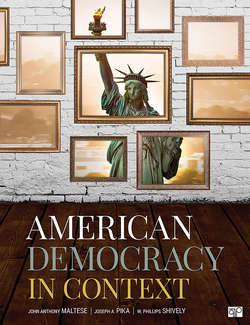Читать книгу American Democracy in Context - Joseph A. Pika - Страница 61
На сайте Литреса книга снята с продажи.
The First Continental Congress
ОглавлениеThough aimed at Massachusetts, the Coercive Acts had potential ramifications for all of the colonies. As a result, representatives from all of the colonies except Georgia met in Philadelphia in September and October 1774 to decide how to respond. The delegates at these meetings of the First Continental Congress, in essence, represented twelve different nations. Although they came together in response to the common threat to their liberties posed by Great Britain, the colonies remained deeply divided on many issues. As historian Merrill Jensen put it, “The large colonies were pitted against small ones; colonies with many slaves were in opposition to those with fewer; colonies that had no western lines contended with those that did.”13 Despite these differences, the First Continental Congress resulted in an agreement by the colonies to engage in a total boycott of British goods.
The First Continental Congress also produced a declaration of rights and grievances. Among other things, the declaration—drawing on the language of the English philosopher John Locke—asserted the right to “life, liberty, and property”; denounced the keeping of British troops in the colonies in times of peace as “against law”; and reiterated that “the foundation of English liberty, and of all free government, is a right in the people to participate in their legislative council.”14 Since the colonists were not represented in Parliament, they claimed the right to a “free and exclusive power of legislation” in their own colonial assemblies, subject only to veto by the king.
The rallying cry of “no taxation without representation” had evolved into something far more significant: All legislation produced by a parliament in which the colonists were not represented was now considered suspect. And colonies with disparate interests and outlooks were uniting against Great Britain and around the cause of liberty. The liberty that the colonists sought was a direct outgrowth of rights espoused by the British tradition. England’s failure to enforce those rights precipitated revolution.
